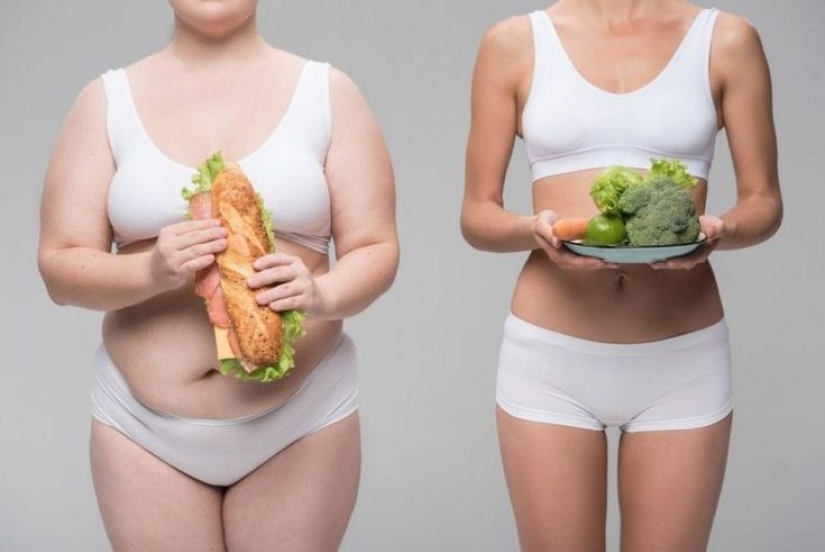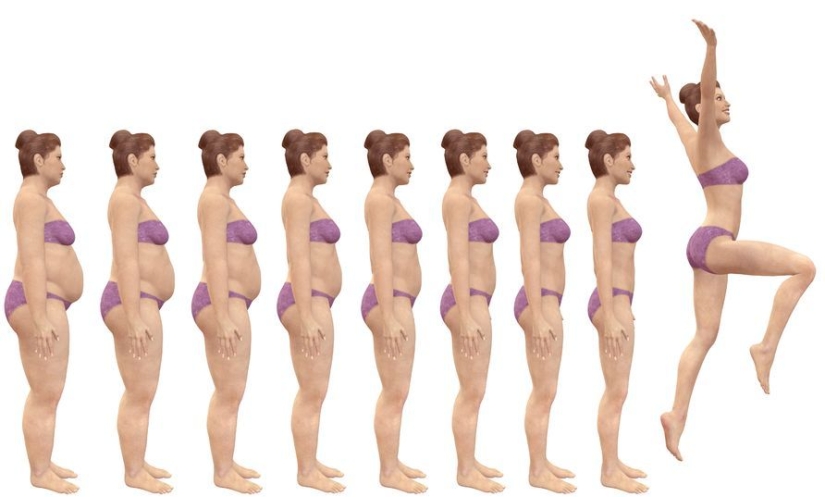Hormones Are Against You: The Shocking Truth About Weight Gain After Dieting
Categories: Health and Medicine | Healthy lifestyle | Science | World
By Pictolic https://mail.pictolic.com/article/hormones-are-against-you-the-shocking-truth-about-weight-gain-after-dieting.htmlWhen we talk about losing weight, we rarely think about the fact that our body actively resists it. This happens because humans as a species have virtually no physiological mechanisms that prevent weight gain. During the formation of Homo sapiens, there was no excess food, so such mechanisms were simply not needed. But the risk of starvation was quite real, and therefore evolution has endowed us with numerous mechanisms aimed at storing and preserving energy in the form of fat.
When we try to lose weight, our body uses all available means to resist it. Let's look at how exactly it does this and whether it is possible to somehow "negotiate" with it.

When following a diet, various adaptations occur in the body: metabolic, neurohormonal and behavioral. Let's start with metabolic ones - these are changes in metabolism that allow the body to reduce energy costs and slow down fat loss.

Daily energy expenditure includes several components:
When you diet, all four components decrease. Let's start with basal metabolism. When we lose weight, we lose fat and muscle. Fat cells spend little energy, and muscle cells spend a lot. It is logical to assume that if there are fewer cells, then the costs of basal metabolism will decrease.

However, the decrease is greater than it should be; it is disproportionate to the weight loss. Research shows that even when maintaining lean body mass (when only fat is lost and muscle mass remains unchanged), the basal metabolic rate decreases more than calculated. It turns out that the body also saves energy on other physiological processes.
The thermic effect of food is reduced simply because less food is consumed, and therefore less energy is required to digest it.
Exercise and non-exercise thermogenesis are reduced for several reasons:

The efficiency of muscle work increases, but only at low loads, when the contribution of glycolysis is small. As the intensity of the load increases, this difference decreases sharply. Interestingly, during subsequent weight gain, the opposite process occurs: muscle efficiency decreases.
Metabolism is restructured due to changes in the functioning of the nervous and endocrine systems. On a diet, the activity of the sympathetic nervous system, responsible for increased energy production and overcoming stress, decreases, and the balance shifts towards the parasympathetic system, which ensures energy storage.
Hormonal production also changes:
In general, dieting reduces levels of substances that directly or indirectly suppress hunger, and increases levels of substances that increase hunger.

Studies show that weight loss (an average of 13.5 kg) results in statistically significant decreases in leptin, peptide tyrosine, cholecystokinin, and amelin, and increases in ghrelin, gastroinhibitory polypeptide, and pancreatic polypeptide. There is also a statistically significant increase in subjectively perceived appetite.
Importantly, circulating levels of appetite mediators that contribute to weight gain after dieting do not return to baseline levels after one year of weight loss. This means that the metabolic adaptations they induced are also present and may last longer, especially if the weight loss was dramatic.
For example, in one study of reality TV contestants who lost nearly 130 pounds, even after 6 years, their resting metabolic rate was still down by as much as 500 calories per day. That's a significant reduction.

Thus, the body saves energy not only during the diet, but also after it, as if fearing a repeated period of starvation. As a result, the person finishes the diet, calculates his maintenance caloric content according to standard formulas, switches to it, but the formulas assume a normal metabolic rate, and the person has a reduced one. And although he believes that he is eating right, in fact, overeating and weight gain occur.
In addition, the level of hunger hormones remains elevated, and it is simply impossible to fight hunger for years - no willpower is enough. Therefore, it is not surprising that 45% of those who lost weight gain it again.
To some extent, it is possible to resist these mechanisms, but you need to be mentally prepared for difficulties.

It is better to switch to a surplus gradually rather than abruptly. Caloric content should be selected individually, because people's reactions differ significantly. There is a study where all participants received a surplus of 1000 calories for 8 weeks, and the weight gain was from 300 g to more than 4 kilograms - the difference was more than 10 times. This depends on the level of hormones, excitability of the nervous system, related everyday activities and other hereditary features.

In general, you shouldn’t relax too much, and then there will be a real chance to maintain the achieved weight.
Losing weight is not just a matter of willpower, but a whole physiological battle with your own nature. And to win it, it is not enough to just eat less - you need to understand how our body works and find compromises with it. How do you cope with the feeling of hunger and slow progress? Do you have personal strategies that really work? Share your experience in the comments - perhaps your advice will help others not to give up on this difficult path
Recent articles

It's high time to admit that this whole hipster idea has gone too far. The concept has become so popular that even restaurants have ...

There is a perception that people only use 10% of their brain potential. But the heroes of our review, apparently, found a way to ...

New Year's is a time to surprise and delight loved ones not only with gifts but also with a unique presentation of the holiday ...